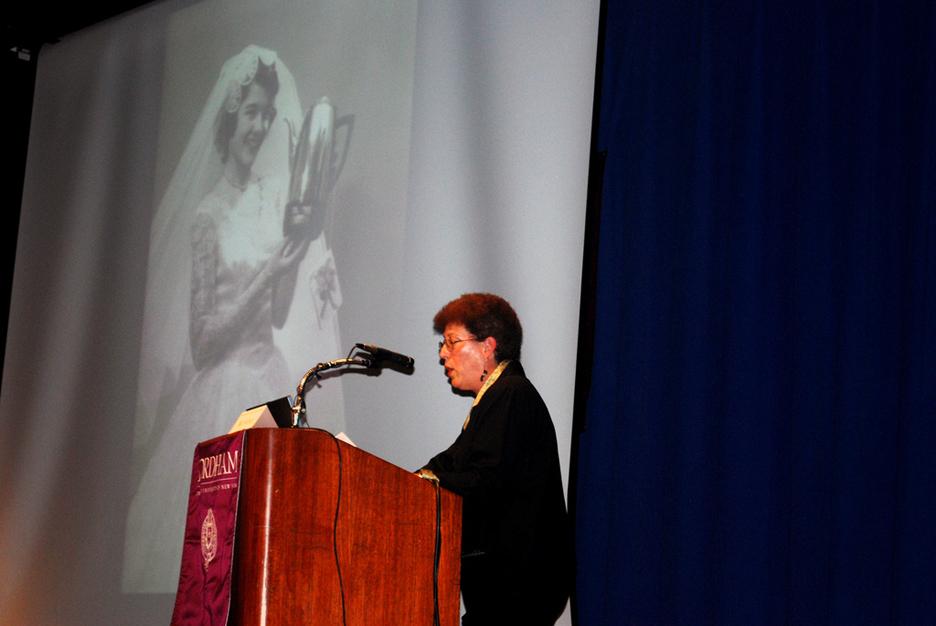FCLC Hosts “Consuming America” Conference
June 25, 2011

Published: September 24, 2009
On Sept. 15, Fordham University’s Center on Religion and Culture sponsored a forum titled “Consuming America: What Have We Done to Ourselves?” in Fordham College Lincoln Center’s Pope Auditorium. The forum provided some alternative insight into the causes of the recession and effects with respect to American consumerism.
The forum featured a panel that discussed how American consumerist culture led to the nation’s present economic woes and how it will affect recovery. Paul Solman, correspondent for The News Hour with Jim Leher, moderated the forum. The panel was composed of Lizabeth Cohen, Ph.D., of Harvard University, author of “A Consumer’s Republic: The Politics of Mass Consumption in Postwar America;” George Ritzer, Ph.D., of the University of Maryland, author of “The McDonaldization of America;” and Vincent Miller, Ph.D., of the University of Dayton, author of “Consuming Religion: Christian Faith and Practice in a Consumer Culture.” According to an advertisement for the event, the stated goal of the forum was to discuss consumerism from the “perspective[s] [of] economics, history, sociology and theology.”
Paul Solman’s introduction explained that the discussion on consumerism would bring the audience past the general consensus of the recession being solely the fault of “foolhearted homebuyers” and “greedy investment bankers,” and redefine the recession as a byproduct of our consumerist economy. Before the actual forum, each panelist gave a short presentation of his or her thoughts on American consumerism and how it brought the American economy to where it is today.
Cohen presented first, using photographs to demonstrate that after World War II, consumerist strategizing prevented the return of the Great Depression by encouraging home ownership and consumption of material goods. She said that this strategizing included the use of propaganda advertisements, such as one featured in a 1950s edition of Life magazine that said, “Spending creates jobs and prosperity.” Cohen explained that the growth of consumer goods production stimulated the postwar economy by providing outlets for Americans to spend their money. This outlet created jobs. But, as a result of changing times, Cohen said that now “Americans are being encouraged to reinvent themselves as thrifty and frugal.”
Ritzer, who spoke after Cohen, didn’t seem particularly confident in such reinvention. He discussed the balance of production and consumption in the American economy, citing part of the reason for the economic collapse as “hyperconsumption.” Ritzer defined hyperconsumption in the U.S. as unusually high levels of consumption—particularly within the middle class—versus lower levels of production.
Ritzer said he blames the U.S. government in part, citing specifically how both former President George W. Bush and former New York City Mayor Rudy Giuliani encouraged citizens to consume in the wake of 9/11. Ritzer noted that even today, consumption is encouraged by the government with the Cash for Clunkers program and rebates for first-time homebuyers. Ritzer claims the government is attempting to rebuild America’s hyperconsumerist culture in the post-recession economy, essentially due to a lack of better options. Ritzer explained that previous alternatives of an economy based upon agriculturalism, industrialism, and services would not successfully function in today’s competitive global economy. Ritzer concluded his presentation and said, “I’m never optimistic about values changing on their own; [consumerism] has become our own religion, where we practice in cathedrals of consumption.”
Miller then stepped in to discuss American consumerism and how it relates to Christianity. “Christianity is formed through private beliefs, it is not a way of life. Thus, modern culture grooms Christianity to itself,” Miller said. “Why doesn’t Catholic social teaching have the impact we wish it would?” In tracing the loss of religion to consumerism, Miller cited three elements of the consumerist cultural scene: commodification, the idea of producing so much Americans no longer have an idea of what a “fair share” is; the nuclear family home; and “clenched living,” in which romanticizing the nuclear family results in a disregard for the living situations of others. He suggests that these factors combined have led Americans to embrace consumerism more than religion, resulting in the consumption-obsessed society in which they participate today.
While the presentations concluded on a bleaker note, the question-and-answer segment seemed to offer more hopeful insight. On the subject of higher taxes, Ritzer said, “As a society, we ought to be spending less money. That money ought to be redirected to projects our country really needs.”
Cohen agreed, adding, “Public project and infrastructure investments create American jobs. It would be a deterrent for excessive private spending.” Cohen said that in America’s inevitable reform to a sustainable economy, “Consumerism won’t go away, but it can be balanced by other priorities.”
About half of the forum’s audience was composed of Fordham students, most attending for a class assignment. Such students included Claire Smith and Sia Tsolas, both FCLC ’12.
“It’s in our interests, since we’re probably going to be International Studies majors,” Smith said.









